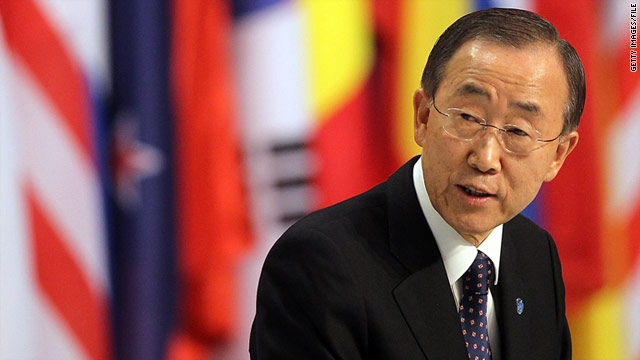Scammer
Banned

U.N. Secretary General Ban Ki-Moon speaks to reporters during a press conference on November 20, 2010 in Lisbon, Portugal.
U.N. Secretary-General Ban Ki-moon said Tuesday the situation in the Ivory Coast is increasingly volatile and the country risks a return to civil war.
The West African nation has fallen into chaos since a presidential runoff election there last month. The country's Independent Electoral Commission said opposition candidate Alassane Ouattara won the election, but its Constitutional Council invalidated those results and declared incumbent President Laurent Gbagbo the winner.
The United Nations, the African Union and other international bodies recognize Ouattara as the victor, but Gbagbo is refusing to step down.
"In the past week, there has been an alarming increase in the use of intimidation by elements of the national security forces loyal to Mr. Gbagbo against the civilian population, and in particular against supporters of President-elect Ouattara," Ban said in New York.
"The tactics include abductions and killings and the propagation of hate speech through the state broadcasting corporation," he continued. "There is a real risk of a return to civil war."
Meanwhile, in the Ivory Coast, Gbagbo dug in his heels, declaring "I am president," in a defiant speech.
He stressed he is the legitimate winner of the election, but said he would be willing to welcome an international committee to review the results to avoid any further violence.
"I don't want any more bloodshed. I don't want any more war," he said.
U.N. peacekeeping chief Alain Le Roy referred to Gbagbo's remarks when he spoke to reporters in New York.
"Mr. Gbagbo has been very clear. He wants no violence, no more blood," Le Roy said. "So all the forces loyal to him should stop immediately provocation, instigating violence, violation of human rights and provoking the UNOCI mission. We have a mandate to fulfill, and we will fulfill that mandate."
Le Roy said Gbagbo's allies have been handing out rifles to members of a "Young Patriots" group, and mercenaries from Liberia and Angola have been hired "to provoke the civilian population and UNOCI personnel."
He said the United Nations appreciated Gbagbo's call for restraint, but said it should be accompanied by a halt to incitement and attacks on Ouattara's supporters.
His and Ban's comments echoed those made by Amnesty International earlier in the day.
Citing eyewitnesses, the rights group said it has heard an increasing number of stories of people arrested or otherwise taken by gunman, often with the cooperation of security forces in the Ivory Coast.
Amnesty said police are accused of attacking a mosque in Grand-Bassam, opening fire on crowds and groping female protesters.
"It is clear that more and more people are being illegally detained by security forces or armed militiamen and we fear that many of them may have been killed or have disappeared," Salvatore Sagues, Amnesty International's West Africa researcher, said in a written statement.
Two U.N. military observers were hurt Saturday in an attack by what Ban called "Young Patriots," according to a statement from the secretary-general.
On Friday, six armed men wearing military uniforms and traveling in a civilian vehicle opened fire on U.N. peacekeepers in Sebroko, the peacekeeping operation reported. The U.N. troops returned fire.
The U.N. Security Council has extended its peacekeepers' mission in Ivory Coast through June 30, despite an expulsion order by Gbagbo.
The Gbagbo government accuses the United Nations of providing military and logistical support to former rebels who are backers of Ouattara -- a charge Ban denied.
"The United Nations has stood on the side of Africa against this attempt to overturn the democratic process and the will of the Ivorian people," he said.
Ban also accused forces loyal to Gbagbo of obstructing the movement of United Nations' personnel and operations in the Ivory Coast, blocking the delivery of key supplies.
"The international community must act ... and act decisively," he said.
